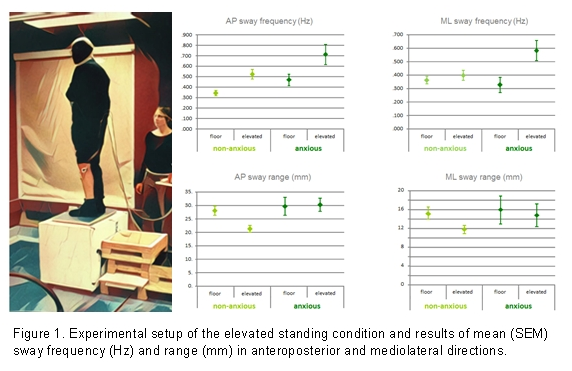Fear of falling is common in older people. Research studies have reported that people who are more fearful have increased postural sway. However, when fear is experimentally induced, a decrease in postural sway can be observed, due to an adaptive tightening of balance control. These contrasting findings suggest different underlying mechanisms whereby generalised and induced anxiety influence balance control. In our study, we examined the differential effects of previously reported fear of falling and generalised anxiety on standing balance control, during an experiment that induced fear by asking people to stand on an elevated box.
Participants were classified with high or low fall concern using the Falls Efficacy Scale International, as well as high or low anxiety, using the Goldberg Anxiety Scale. We measured centre of pressure underfoot while participants stood at floor level and on a 65cm elevated box. Non-anxious participants showed an adaptive tightening of balance control in the elevated condition, effectively reducing sway range. The anxious group increased sway frequency but did not constrain sway range (Figure 1). The postural control response to the elevated standing condition was similar for fearful and non-fearful participants.

Our results suggest that older adults with generalised (trait-like) anxiety are less able to appropriately tighten balance control and constrain postural sway in a condition where the potential consequences associated with instability are more hazardous. This is in contrast to young and older adults without anxiety, who show an adaptive tightening of postural control under threatening conditions. This suggests a context-dependent emotional phenomenon interfering with balance control, as postural control changes were not associated with differences in baseline sensorimotor function. Considering the influence of psychological factors (beyond standard clinical examination of concern about falling) may therefore be important when assessing balance and implementing interventions for improving balance in older people.
Publication
Sturnieks DL, Delbaere K, Brodie MA, Lord SR. The influence of age, anxiety and concern about falling on postural sway when standing at an elevated level. Hum Mov Sci. 2016 15;49:206-215
http://www.sciencedirect.com/science/article/pii/S0167945716300902
About the Author

Dr Daina Sturnieks
Falls, Balance and Injury Research Centre at Neuroscience Research Australia
Dr Daina Sturnieks is a Research Fellow in the Falls, Balance and Injury Research Centre at Neuroscience Research Australia, Sydney. Her research focuses on understanding sensorimotor and neurocognitive contributions to falls in older people and clinical groups, and trialling novel interventions to prevent falls involving balance, stepping and cognitive exercises.
Copyright
© 2018 by the author. Except as otherwise noted, the ISPGR blog, including its text and figures, is licensed under a Creative Commons Attribution-ShareAlike 4.0 International License. To view a copy of this license, visit https://creativecommons.org/licenses/by-sa/4.0/legalcode.
ISPGR blog (ISSN 2561-4703)
Are you interested in writing a blog post for the ISPGR website? If so, please email the ISGPR Secretariat with the following information:
- First and Last Name
- Institution/Affiliation
- Paper you will be referencing
